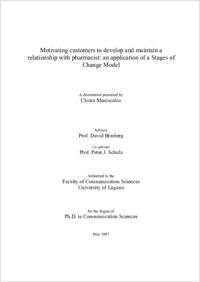Motivating customers to develop and maintain a relationship with pharmacists : an application of a Stages of Change Model
- Maniscalco, Chiara
- Brinberg, David (Degree supervisor)
- Schulz, Peter (Degree committee member)
-
27.06.2007
153
Thèse de doctorat: Università della Svizzera italiana, 2007 (jury note: Summa cum laude)
English
A consistent branch of research in health communication has been focused on the study of the pharmacist - patient relationship. In past decades, the pharmacist and his role in the health care setting has shifted from a product oriented approach, where the primary focus was the production and compound of medicines, to a more patient oriented approach, with main focus becoming the understanding and caring for clients and the problems they bring to their health care providers. As a consequence, research in the health communication field, with a focus on community pharmacy settings needs to examine strategies to get the pharmacist closer to the clients, developing a long – term relationship, and adopting a more patient- oriented information approach to move closer to the needs of the client. The main purpose of my doctoral thesis is to examine the pharmacist - client relationship focusing in particular on the attempt to integrate the Stages of Change Model (Prochaska and DiClemente, 1983), with two models currently in use to describe relationship development in the pharmacy context, in order to identify strategies that can support the pharmacists in building a relationship of loyalty with their clients in the future. I hypothesized that targeting health information according to the level of the relationship clients are in could produce the necessary loyalty to commit to the pharmacist and to enhance the long run acceptance and effectiveness of the health message. In particular, the empirical section is devoted to understanding how to produce the necessary loyalty that can lead to better future response for the therapeutic and health needs of the client. The hypothesis was tested in the context of Tessin pharmacist – client relationship by means of a three phase study: an explorative study, a descriptive study, and finally an intervention study. Using the data collected in the descriptive study, two models of relationship development were tested: one static and one dynamic. The static model treats the perceived relational benefits, relationship selling behaviours, perceived expertise and stages of change constructs as antecedents of trust. The dynamic model adds the Stages of Change moderating effect on perceived benefits, perceived expertise, perceived relationship selling behaviours, as antecedents of trust. In the dynamic model, trust is directly influenced by the perceived expertise of the pharmacist, relationship selling behaviours, and perceived relational benefits. The Stages of Change Model moderated the relationship between perceived relational benefits and trust, and approached significance in moderating the relationship between perceived expertise and trust. The moderated relationship influences the way to structure an intervention to increase client intention to frequent the pharmacy in the future: in particular, it suggests tailoring the message depending on the stage of the relationship. The analysis of the data shows that targeting health messages according to the level of client relationship (developmental stage/maintenance stage) and building the messages focusing on the variables most influential to the particular relationship stage should bring to a more “loyal client” in the future. Furthermore, results in the intervention study show that for people in the developmental stage, a targeted message, that is a message focused on relational benefits, was more effective than either no message, or a stage mismatched message.
- Language
-
- English
- Classification
- Medicine
- License
-
License undefined
- Identifiers
-
- RERO DOC 7970
- URN urn:nbn:ch:rero-006-108349
- ARK ark:/12658/srd1318031
- Persistent URL
- https://n2t.net/ark:/12658/srd1318031
Statistics
Document views: 363
File downloads:
- 2007COM005.PDF: 159
